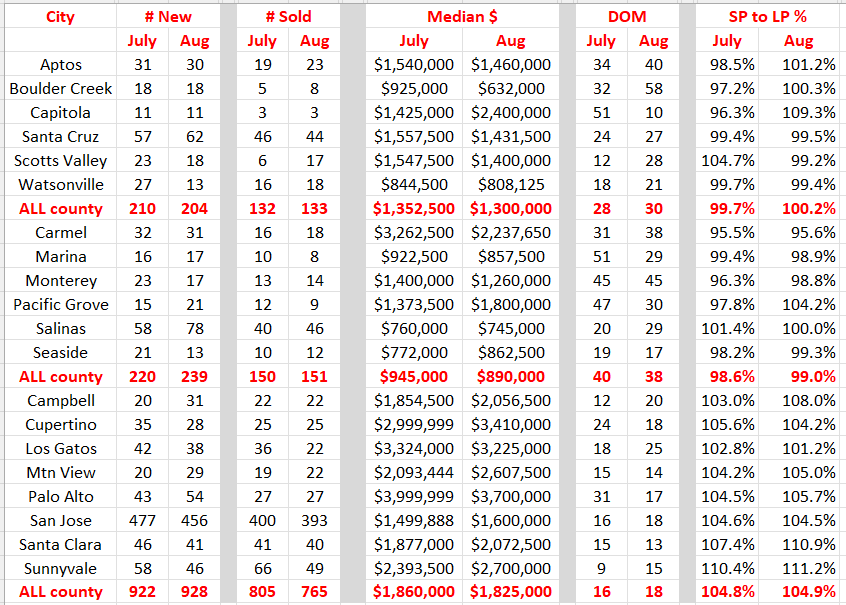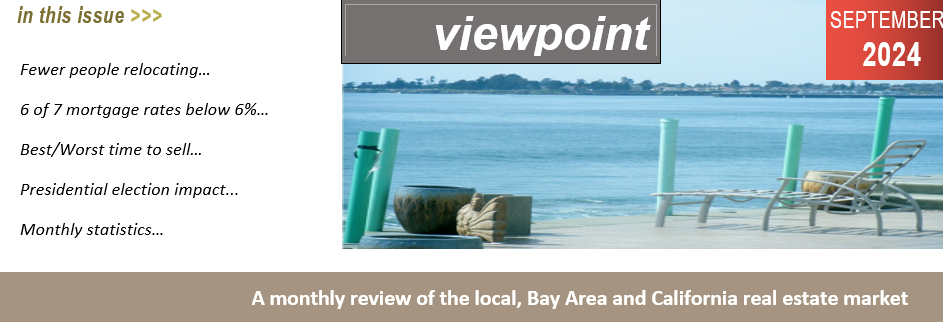SEPTEMBER 2024
Experts reveal why fewer people are relocating.
Instead of moving across town or even to a different state, Americans are moving less. According to the Brookings Institution, the share of Americans moving has now reached its lowest in history, falling to 8.7 percent within the last few years. The main barrier seems to be cost. Even for those who own homes, many can't afford to pack up and go. Amanda Pertuset, a real estate agent with 17 years of experience, says "the cost of housing versus their down payment and the potential maintenance of the property are just sitting a lot of buyers out, while those who own their homes would have to cash in every penny of equity and even then, would still have a significant mortgage payment."
When it comes to first-time homebuyers, depending on where you live, it might be cheaper to rent than it is to buy, according to Dallas-area broker Tyler Kreis. "Until your standard, entry level homes become that $2,000 to $2,500 mortgage payment again, I don't think we're going to see that many first-time homebuyers jumping back in." Aside from cost, remote jobs, an aging population, and more households with two incomes are a few other reasons why people are staying put and not moving.
But he does expect more people to begin moving and the market to pick back up if interest rates fall below six. Which might happen later this year. If it has a five in front of it, like a 5.99%, we're expecting it to get really busy here again." said Kreis. Aside from cost, remote jobs, an aging population, and more households with two incomes are a few other reasons why people are staying put and not moving.
Allstate to hike home rates in CA wildfire areas by 34%.
Allstate got the okay to raise homeowners' insurance rates across California by more than a third in areas prone to wildfires. The Illinois-backed insurer, the sixth largest in the state, will raise home insurance premiums by an average 34.1 percent as the state faces a deepening property insurance crisis, reported Bloomberg.
The rate hike, beginning in November, will affect 350,000 policyholders - some facing premium increases up to 650 percent, while others may see their rates drop by as much as 57 percent, according to company filings with the state Department of Insurance.
6 out of 7 mortgage holders have rates below 6% nationwide.
Nationwide, 85.7 percent of U.S. homeowners with mortgages have an interest rate below 6 percent, down from 90.6 percent at the start of last year. Holding such a low rate is prompting many to stay put instead of selling and buying another home at a higher rate - called the "lock-in effect." That effect has kept the supply of available homes for purchase artificially low.
But for most people, it's not realistic to stay put forever, which is why the share of homeowners with rates below 6 percent is inching downward. Some homeowners are opting to give up their low rate in order to move. Many are selling because a major life event such as a job change, or divorce has given them no other choice. Mortgage rates have declined in recent weeks causing homebuyer mortgage payments to fall for the first time since 2020. The current average weekly mortgage rate (6.46 percent) is the lowest in 15 months.
Best and worst time to sell a house in 2025.
According to statistics, the best months to sell a home are from spring through late summer (April to October), while the worst time to sell a house is from fall to winter (November to March). Understanding seasonal trends, such as weather, days on the market, home prices, and market competitiveness, is essential to determining the best month to sell a house. Whether you're a homeowner, investor, or real estate agent representing a seller, knowing when to hit the market is vital to closing the best deal.
The best time to sell a house falls between April and October, as buyer demand outpaces the number of homes available for sale and homeowners can sell their properties for higher prices. According to real estate charts, in June 2024, the median home sale price was $426,900,1 the highest record within the past 12 months. While property owners compete with other sellers during the spring homebuying season, houses still sell faster because of the housing shortage.
Highest Home Prices in June
If you want to earn a higher profit from the sale of your property, the best month to sell a house is June. Based on FRED's housing market stats,1 in June 2024, homebuyer demand was high, with properties sold at a median sales price of $426,900. The high demand and low inventory are some factors that drive housing prices up, allowing sellers to charge more for their properties.
More Homes Sold Above List Price in June
In June 2024, 35.1% of homes sold above the list price,2 showing the intense competition in the market. Home prices skyrocketed as early as April, driven by high demand from homebuyers, before declining in September. During the spring homebuying season, the market sees bidding wars, with sellers receiving multiple offers from qualified buyers.
According to HomeLight's recent housing market research, the best time to sell a house varies by location.3 The table below shows the best month to list your home in 21 major US cities and the premium a seller realizes by listing during the peak month. Keep in mind that closing a sale can still take a few months after listing.
Seasonality is one factor that may have influenced home sales in specific cities. For example, properties in Chicago, Illinois, were sold 6.17% above the asking price in the summer. These figures show strong buyer demand at this time of year when the winter has finally gone, and the warm weather has begun. Additional factors influencing buyer demand in local markets include interest rates, interstate migration, unemployment, income levels, and market conditions.
What's the impact of Presidential elections on the Housing Market?
It's no surprise that the upcoming Presidential election might have you speculating about what's ahead. And those unanswered thoughts can quickly spiral, causing fear and uncertainty to swirl through your mind. So, if you've been considering buying or selling a home this year, you're probably curious about what the election might mean for the housing market - and if it's still a good time to make your move.
Here's the good news that may surprise you: typically, Presidential elections have only had a small, temporary impact on the housing market. Here's a look at decades of data that shows exactly what's happened to home sales, prices, and mortgage rates in previous Presidential election cycles, so you can move forward with the facts as you weigh the pros and cons of your homeownership decision.
Home Sales
In the month leading up to a Presidential election, from October to November, there's typically a slight slowdown in home sales (3-5%). In fact, data from the Department of Housing and Urban Development (HUD) and the National Association of Realtors (NAR) shows after 9 of the last 11 Presidential elections, home sales went up the year after the election, and it's been happening consistently since the early 1990s (see chart below):
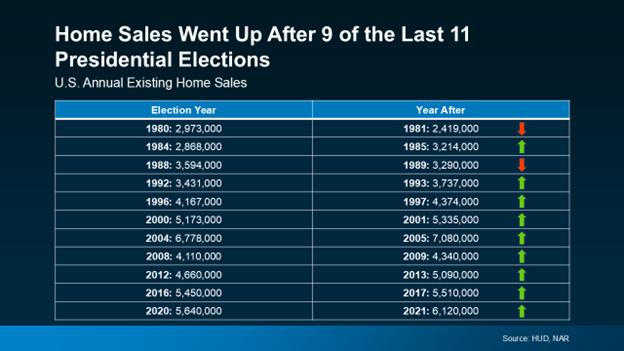
Home Prices
You may also be wondering about home prices. Do prices come down during election years? Not typically. As residential appraiser and housing analyst Ryan Lundquist notes: "An election year doesn't alter the price trend that is already happening in the market."
Home prices generally rise over time, regardless of an election cycle. So, based on what history shows, you can expect the current pricing trend in your local market to likely continue, barring any unusual market or economic circumstances. The latest data from NAR reveals that after 7 of the last 8 Presidential elections, home prices increased the following year (see chart below):
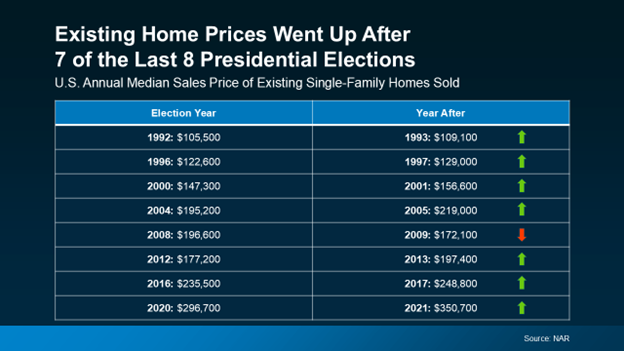
The one outlier was from 2008 to 2009, which was during the height of the housing market crash. That was certainly not a typical year. Today's market, however, is much more resilient. And while prices are moderating nationally, they aren't on an overall decline.
Mortgage Rates
And the third thing that's likely on your mind is mortgage rates since they impact your monthly payment if you're financing a home. Looking at the last 11 Presidential election years, data from Freddie Mac shows mortgage rates decreased from July to November in 8 of them (see chart below):
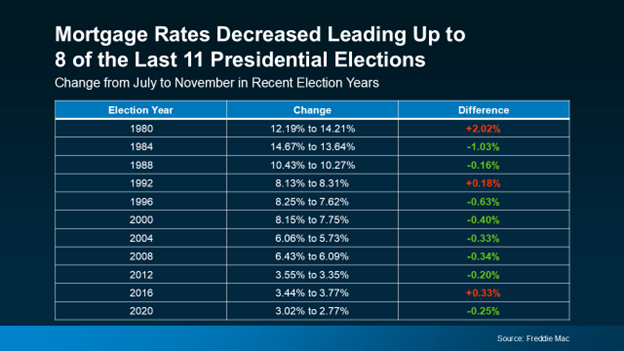
And this year, we've already started to see that happen. Most experts also forecast mortgage rates will ease slightly throughout the rest of 2024. If that happens - and all signs right now indicate it should - this year will continue to follow the trend of declining rates. So, if you're looking to buy a home in the coming months, this could be great news for your purchasing power.
What This Means for You
What's the big takeaway? While Presidential elections do have some impact on the housing market, the effects are usually minimal. As Lisa Sturtevant, Chief Economist at Bright MLS, says: "Historically, the housing market doesn't tend to look very different in presidential election years compared to other years." For most buyers and sellers, elections don't have a major impact on their plans. While it's natural to feel a bit uncertain during an election year, history shows the housing market remains strong and resilient. And this means you don't have to pause your plans in the meantime. For help navigating the market during this election cycle, reach out to a local real estate agent.
July vs August for Santa Cruz & Monterey Counties & the Bay Area
Comments: So far noting significant happening, even with some interest rate decline. New listings are still flat with sales actually declining. The ALL-county median price for single family homes is down for the first time this year. Signs of more negotiating?? The days on the market stayed relatively the same and the sale to list price too. Starting to get a little annoying and waiting for a shoe to drop. (Display of MLS data is deemed reliable and is not guaranteed accurate by the MLS as of 8/31/24)
